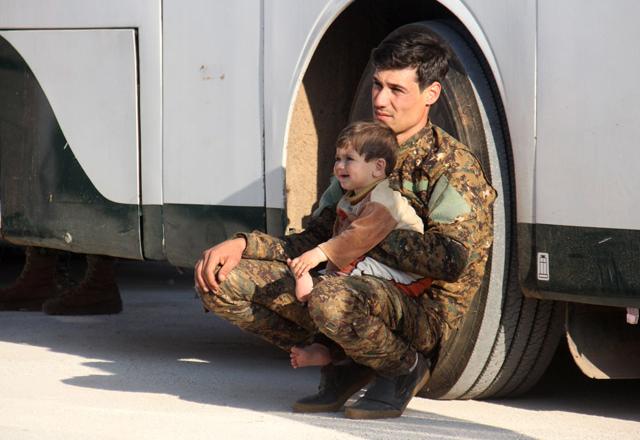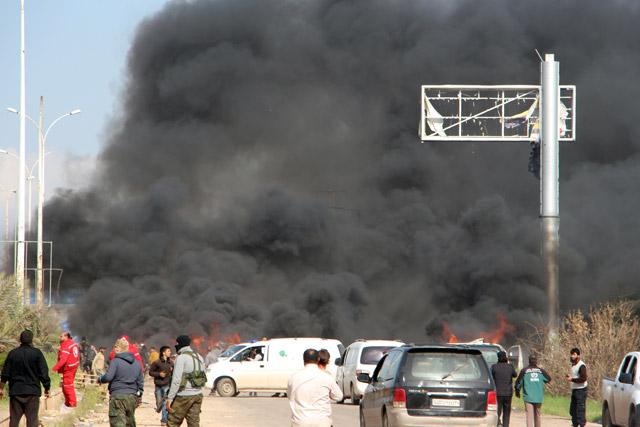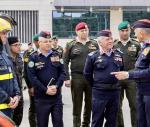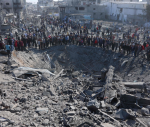You are here
Syria evacuations resume after deadly bombing
By AFP - Apr 19,2017 - Last updated at Apr 19,2017

A Syrian pro-government fighter sits with a child as civilians and fighters from the government-held towns of Fuaa and Kafraya, which have been under crippling siege for more than two years, reach with buses the edge of the rebel-held transit point of Rashidin outside government-held second city Aleppo, on Wednesday (AFP photo)
RASHIDIN, Syria — Evacuations of thousands of besieged Syrians resumed on Wednesday with tight security in place after a weekend bombing against those leaving government-held areas killed dozens, including nearly 70 children.
A large convoy of buses set out from the government-held towns of Fuaa and Kafraya in Idlib province, carrying 3,000 people to the rebel-held transit point of Rashidin near Aleppo, an AFP correspondent said.
At the same time, 11 buses carrying around 300 people left rebel-held Zabadani, Serghaya and Jabal Sharqi in Damascus province, the Syrian Observatory for Human Rights monitor said.
In Rashidin, security was tight after a devastating bomb attack on evacuees at the site on Saturday that according to the observatory killed 126 people, including 68 children.
Most of the dead were from the two Shiite-majority towns, with a handful of aid workers and rebels guarding the convoy also killed.
Dozens of wounded were taken to hospitals in nearby rebel-held territory, while others were taken to Aleppo, which government forces regained full control of late last year.
‘I left for my children’
Armed rebels were standing guard at Rashidin on Wednesday and carefully inspecting vehicles arriving in the area.
“We chose a different location as the gathering point for fighters from Fuaa and Kafraya with their families, because we are obliged to protect them until they leave here,” said rebel fighter Abu Obeida Al Shami.
Buses were parked in a semi-circle, forming a makeshift barrier around an area in the centre of a lot where evacuees including dozens of children milled.
“Where do I even start? It would have been easier if we had just died. Death is so much easier than this humiliation,” said elderly evacuee Abu Ahmad.
He told AFP he was preparing himself never to see his hometown of Fuaa again.
“Someone like me, who is already 85 years old — I’m going to die tomorrow or the day after.”
Pro-government militiamen among those being evacuated from Fuaa and Kafraya squatted next to one bus, smoking cigarettes.
Standing nearby, 55-year-old Um Joud from Fuaa said it was difficult to describe how she felt.
“I’m not afraid, because everything is in God’s hands,” she told AFP.
“Of course I would have preferred to stay in my home, but I left for the sake of my children and their lives and futures.”
The evacuations are part of a deal between government and opposition representatives that is also seeing residents and rebels transported out from several areas under regime siege near Damascus, primarily Madaya and Zabadani.
It was brokered late last month by Qatar, a longtime opposition supporter, and Iran, a key regime ally, but its implementation had been repeatedly delayed.
When Wednesday’s evacuations are complete, a total of 8,000 people should have left Fuaa and Kafraya in exchange for 2,500 civilians and rebels from opposition areas.
Zabadani and Madaya “are now empty of any rebel presence”, said Mayyada Al Aswad, a member of the coordinating committee for the operation on the government side.
Wednesday’s evacuations mark the end of the first stage of the deal, with a second phase due to begin in June.
Fuaa and Kafraya will be emptied entirely, with residents and fighters heading to Aleppo and then on to government-held Latakia or Damascus.
All rebels are expected to leave Madaya, Zabadani, and other nearby oppositions-held areas, but civilians who want to remain may do so.
Those leaving rebel-held areas will head to Idlib province, which is held by an opposition alliance.
30,000 to be evacuated
In all, up to 30,000 people are expected to leave under the deal.
President Bashar Al Assad says evacuation deals are the best way to end the six-year war, but the opposition says they amount to forced relocation after years of bombardment and siege.
There was no immediate claim of responsibility for Saturday’s bombing, which was condemned by Syria’s opposition, including the powerful Ahrar Al Sham rebel group.
The government blamed “terrorists” — a catch-all term for its opponents.
Syrian state television on Wednesday reported another bomb blast in Aleppo city that killed six people, but the report could not be immediately confirmed.
The United Nations says 600,000 Syrians live under siege, mostly by the Syrian army, but also by rebels or the Daesh terror group.
The war has killed more than 320,000 people since it began with anti-government protests in March 2011. More than half of the population have been forced from their homes.
Related Articles
RASHIDIN , Syria (AFP) — Nearly 70 children were among those killed when a suicide car bombing tore through buses carrying evacuees from bes
RASHIDIN, Syria — A suicide car bomb attack on buses carrying Syrians evacuated from two besieged government-held towns killed 43 peop
DAMASCUS — A bomb killed six people and wounded more than 30 in Syria's second city Aleppo on Wednesday, state television reported, without
















